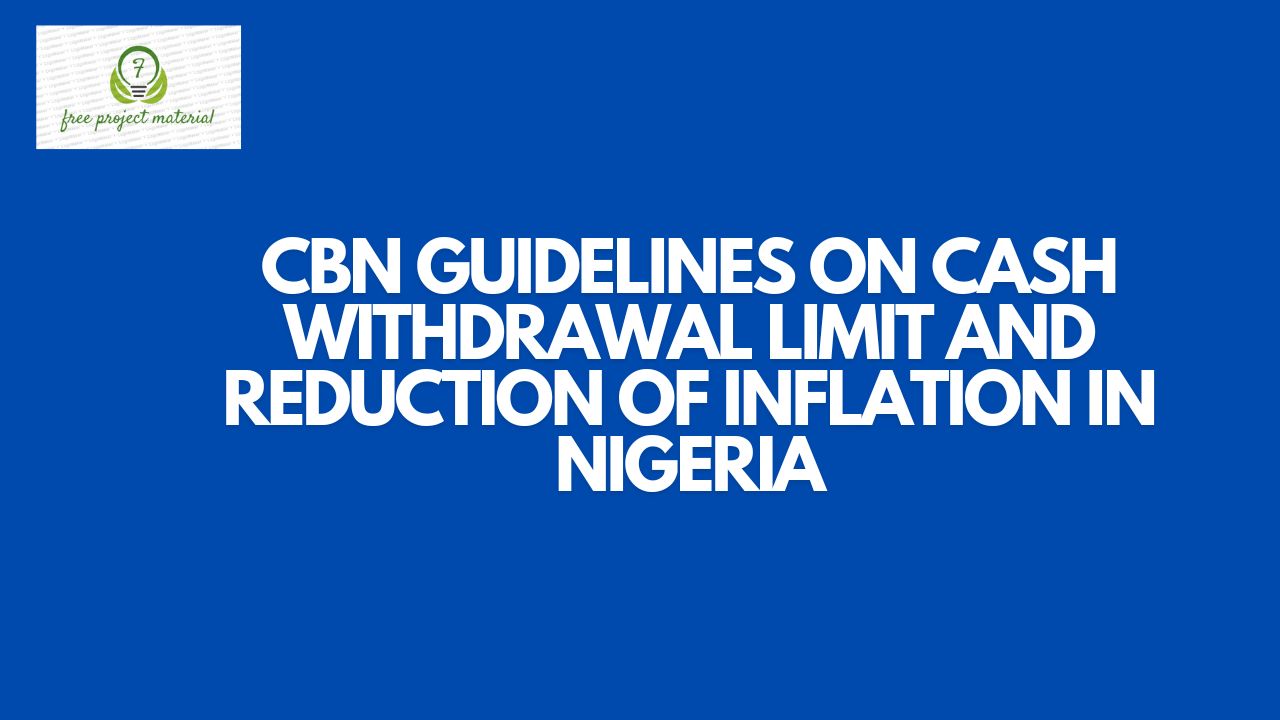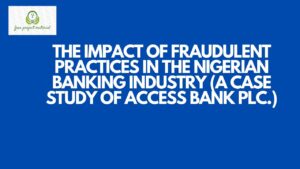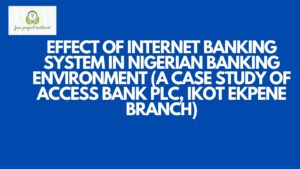ABSTRACT
This study on CBN guidelines on cash withdrawal limit and reduction of inflation in Nigeria (2013-2023) (a case study of Ikot Ekpene) aims to examined the impact of cash withdrawal limit on the reduction of inflation in Nigeria. To achieve the research objectives, the study made use of survey research design. Taro Yamane formular was used to select thirty-two (32) respondents as sample size for the study. The instrument of data collection was self- developed questionnaire and the forms were personally administered. The data obtained were analyzed using simple percentages and tables. The findings of this study revealed that; CBN implemented cash withdrawal limit has not led to the reduction of inflation in Nigeria. CBN cash withdrawal limit has negative effect on the Nigerian economy which consequently results in the reduction in the standard of living of the people. The challenge faced by Nigerians due to the CBN implemented cash withdrawal limit is lack of access to cash. The level of adaptability of Nigerians to the implemented CBN cash withdrawal limit is low. This implies that the CBN implemented cash withdrawal limit has not been able to curtail the level of inflation in the country, rather increasing rate of inflation has been experienced even after the implementation of the CBN cash withdrawal limit. Therefore, it is recommended that the CBN cash withdrawal policy be reviewed and systematically assigned a timeframe of positive impact, in order to ascertain its usefulness and capability to provide the promised benefits as laid down in the policy.
LIST OF TABLES
Pages
Table 4.2.1: Responses to Research Question One – – 47
Table 4.2.2: Responses to Research Question Two – – 48
Table 4.2.3: Responses to Research Question Three – – 49
Table 4.2.4: Responses to Research Question Four – – 50
TABLE OF CONTENTS
PAGES
Title Page – – – – – – – – i
Certification – – – – – – – – – ii
Dedication – – – – – – – – – iii
Acknowledgements – – – – – – – iv
Abstract – – – – – – – – – v
List of Tables – – – – – – – – vi
Table of Contents – – – – – – – – vii-ix
CHAPTER ONE
INTRODUCTION
1.1 Background of the Study – – – – – – 1
1.2 Statement of the Problem – – – – – – 4
1.3 Objectives of the Study – – – – – – 6
1.4 Research Questions – – – – – – 6
1.5 Significance of the Study – – – – – – 7
1.6 Scope and Limitations of the Study – – – – 7
1.7 Organization of the Study – – – – – 8
1.8 Definition of Terms – – – – – – 9
CHAPTER TWO
REVIEW OF RELATED LITERATURE
2.1 Concept of Cashless Policy and Cash Withdrawal Limit – 13
2.1.1 CBN Cash Withdrawal Limit – – – – – 13
2.1.2 CBN Guidelines for Cash Withdrawal Limit – – – 20
2.1.3 History of Cashless Policy in Nigeria – – – – 22
2.1.4 Challenges of Cashless Policy In Nigeria – – – – 23
2.1.5 Prospect of Cashless Policy in Nigeria – – – 26
2.1.6 Ways of Ameliorating the Challenges encountered by the implementation of Cashless policy and CBN withdrawal limit – 28
2.1.7 Effects of Inflation in Nigeria – – – – – 32
2.1.8 Determinants of Inflation In Nigeria – – – – 35
2.1.9 Inflation Rate from 2013-2023 – – – – – 36
2.2 Theoretical Framework – – – – – – 37
2.3 Empirical Review – – – – – – – 39
2.4 Summary of Related Literature – – – – – 41
2.5 Research Gap – – – – – – – 42
CHAPTER THREE
RESEARCH METHODOLOGY
3.1 Research Design – – – – – – – 43
3.2 Area of the Study – – – – – – – 43
3.3 Population of the Study – – – – – – 43
3.4 Sample and Sampling Techniques – – – – 43
3.5 Source and Nature of Data – – – – – 44
3.6 Instrument and Method of Data Collection – – – 44
3.7 Method of Data Analysis – – – – – – 45
3.8 Empirical Specification of model – – – – 45
3.9 Ethical Issues – – – – – – – 46
CHAPTER FOUR
DATA PRESENTATION, ANALYSIS AND INTERPRETATION
4.1 Analysis of Researcher Question – – – – 47
4.2 Discussion of Findings – – – – – – 51
CHAPTER FIVE
FINDINGS, CONCLUSION AND RECOMMENDATIONS
5.1 Findings – – – – – – – – 54
5.2 Conclusion – – – – – – – – 54
5.3 Recommendations – – – – – – – 55
5.4 Implication of Findings – – – – – – 56
5.5 Contribution of Knowledge – – – – – 56
5.6 Suggestion For Further Studies – – – – – 57
References
Appendix
CHAPTER ONE
INTRODUCTION
1.1 Background of the Study
Monetary policy has been a tool for economic management to bring about sustainable economic growth and development. Monetary institutions are saddled with the responsibility of using monetary policy to grow the economy. In Nigeria, monetary policy has been used since the central bank of Act of 1958 (Elechi and Rufus, 2016). This role of the central bank has facilitated the emergency of active money market where treasury bills, a financial instrument used for open market operations and raising debt for government has grown in volume and values becoming prominent earning assets for investors and source of balancing liquidity in the market. Our economy has witnessed lots of economic policy including the cashless policy rolled out by the CBN. One of the prerequisite for the development of national economy according to Ajayi and Ojo (2006) is to encourage a payment system that is secure, and affordable. In this regard, developed countries of the world, to a large extent, are moving away from paper payment instruments toward electronic ones, especially payment cards (Humphrey, 2004).
The Central Bank of Nigeria has reviewed upward the limit on cash withdrawals made by individuals and organisations. Ahead of the distribution of the redesigned naira notes, the bank had on December 6 2022 announced a new policy limiting over-the-counter cash withdrawals by individuals and corporate entities to N100, 000 and N500, 000, respectively, per week (CBN, 2022).
The upward review comes after the National Assembly asked the bank to considerably adjust the withdrawal limits in response to public outcry on the policy. The new directive which was communicated through a letter addressed to all banks, and signed on Wednesday 15 2023 Februaryby the Director of Banking Supervision, Haruna Mustafa, now allows individuals to withdraw up to N500,000 weekly and organisations, N5 million weekly. The initial limit was N100,000 for individuals (Gbadamosi, 2022).
In the event of compelling circumstances where cash withdrawal exceeds the limits required for legitimate purposes, such requests will attract a processing fee of 3 percent and 5 percent for individuals and corporate organizations, respectively. And in such cases, the financial institutions are directed to obtain some information from the customer, at the minimum, and upload the same on the CBN portal created for the purpose (CBN, 2022).
The Nigerian Governors’ Forum in early February 2023 warned that the policy may drive the nation’s economy into a recession. In its inflation report Wednesday, the National Bureau of Statistics (NBS) said that increases were recorded in all Individual Consumption by Purpose (COICOP) divisions that yielded the headline index (Gbadamosi, 2022).
“However, on a year-on-year basis, the headline inflation rate was 6.22 per cent points higher compared to the rate recorded in January 2022, which was 15.60 per cent. “This shows that the headline inflation rate (year-on-year basis) increased in January 2023 when compared t o the same month in the preceding year (i.e., January 2022),” it said (Ayodeji, 2022).
The report noted that the contributions of items on a class basis to the increase in the headline index are bread and cereal (21.67 per cent), actual and imputed rent (7.74 per cent), potatoes, yam and tuber (6.06 per cent), vegetables (5.44 per cent), and meat (4.78 per cent). “On a month-on-month basis, the percentage change in the All-Items Index in January 2023 was 1.87 per cent, which was 0.15 per cent points higher than the rate recorded in December 2022 (1.71 per cent). “This means that in January 2023, on average, the general price level was 0.15 per cent higher relative to December 2022. “The percentage change in the average CPI for the twelve months period ending January 2023 over the average of the CPI for the previous twelve months period was 19.36 per cent, showing a 2.49 per cent increase compared to 16.87 per cent recorded in January 2022,” the report said (Ayodeji, 2022).
Therefore, this study seeks to ascertain the if the cash withdrawal limit has led to the reduction of inflation in Nigeria between 2013 and 2023.
1.2 Statement of Problem
Governor of Central Bank of Nigeria (CBN) on 28th January 2023 said that the new cash withdrawal limit policy has moderated inflation, will help in stabilizing exchange rate, strengthen naira, support activities of security agencies and reduce incidences of ransom taking in the country.
CBN governor who disclosed this during the fact-finding interactive session held at the instance of the House of Representatives’ Ad-hoc Committee on the review of the CBN cashless policy and extension of timeframe of the currency swap programme, argued that the collection of the old notes has successfully attained 75 percent implementation level at the hinterland, through the 30,000 super agents deployed by the apex bank, out the 1.5 million bank agents spread across the country. While stressing that the new naira redesigned policy was in the overall interest of Nigerians, no Nigerian will lose money under the new naira design policy.
But the reverse seems to be the case as amid the uncertainties being faced by Nigerians due to the scarcity of the redesigned Naira notes, the nation’s inflation rate rose in January 2023 after recording a fall in December 2022. Inflation rose to 21.82 per cent in January compared to 21.34 per cent in December, the National Bureau of Statistics announced in march 2023. The statistics office said the headline inflation rate rose to 21.82 per cent compared to December 2022 headline inflation rate which was 21.34 per cent (NBS, 2023).
The January 2023 inflation rate showed an increase of 0.47 per cent points when compared to December 2022 inflation rate, it said. Nigerians have in recent weeks faced an unprecedented cash crunch as a result of the naira redesign policy of the Central Bank of Nigeria (CBN). The crisis has plunged many citizens into hardship, with numerous others finding it extremely difficult to meet their basic daily needs. Therefore, this study seeks to examine CBN Guidelines on cash withdrawal limit and reduction of inflation in Nigeria (during the period of 2013 to 2023).
1.3 Objectives of the Study
- To determine if the implementation of the CBN cash withdrawal limit has led to a reduction of inflation in Nigeria
- To determine the effect of CBN cash withdrawal limits on the Nigerian economy?
- To determine the challenges faced by the masses due to the implementation of the CBN cash withdrawal limit in Nigeria
- To ascertain the adaptability of Nigerians to the CBN implemented cash withdrawal limit
1.4 Research Questions
- Does the CBN implemented cash withdrawal limit leads to the reduction of inflation in Nigeria?
- What is the effect of CBN cash withdrawal limits on the Nigerian economy?
- What are the challenges faced by Nigerians due to the implementation of the CBN cash withdrawal limit?
- What is the level of adaptability of Nigerians to the CBN implemented cash withdrawal limit?
1.5 Significance of the Study
This study will be an added source of information to the stakeholders in the financial sectors as well as the apex bank in particular on the unmerited challenges faced by Nigerians on the implementation of the CBN cash withdrawal limit
This study will educate stakeholders in the financial sector on ways to solve the problems limiting the acceptance and adoption of the CBNs cashless policy as well as the CBN cash withdrawal limit.
This study will educate the general public on the need for the acceptance and adoption of the cashless policy educating the general public of the advantages of the policy
1.6 Scope and Limitation of the Study
This study focused on CBN guidelines on cash withdrawal limit and reduction of inflation in Nigeria (from 2013 to 2023).
During the conduct of this research work, some factors posed as constraints tended to undermine the efforts of the researcher to carry out the research study to such a depth and in such a manner that it ought to have been carried out judging from the relevance of the topic. such factors include:
- Reluctant attitudes of respondents to give attention and provide answers to the questionnaire forms.
- Financial constraint- Insufficient fund tends to impede the efficiency of the researcher in sourcing for the relevant materials, literature or information and in the process of data collection (internet, questionnaire and interview).
- Time constraint- The researcher will simultaneously engage in this study with other academic work. This consequently will cut down on the time devoted for the research work.
1.7 Organization of the Study
The study is organized into five chapters; chapter one is the introduction which includes: background of the study, research questions, scope of the study, organization of the study and definition of terms.
Chapter two is for the reviews of related literature on the subject matter that is the contribution of scholars and authors on the subject matter.
Chapter three describes the researcher design and methodology, population of the study sample and sampling techniques, instrumentation, method/plan of data analysis and problem of data collection.
Chapter four is concerned with data presentation, analysis and interpretation.
Chapter five gives the summary of findings, conclusion and recommendation
1.8 Definition of Terms
Payment– the action or process of paying someone or something or of being paid
Economy– the state of a country or region in terms of the production and consumption of goods and services and the supply of money.
Transactions– an instance of buying or selling something.
Cash– money in coins or notes, as distinct from cheques, money orders, or credit.
Internet– a global computer network providing a variety of information and communication facilities, consisting of interconnected networks using standardized communication protocols.
CBN: CBN means Central Bank of Nigeria – This is the central financial body that is charged the responsibility of managing Nigeria money and ensuring economic development.
Access Products – Products that allow consumers to access traditional payment instrument electronically, generally from remote locations.
ATM Card – An ATM card (also known as a bank card, client card, key card, or cash card) is a payment card provided by a financial institution to its customers which enables the customer to use an automated teller machine (ATM) for transactions such as: deposits, cash withdrawals, obtaining account information, and other types of banking transactions, often through interbank networks.
Electronic Money – Monetary value measured in currency units stored in electronic form on an electronic device in the consumer’s possession. This electronic value can be purchased and held on the device until reduced through purchase or transfer.
Internet Banking– This is a product that enables the Bank leverage on the Internet
Banking System: Module in-built on the new Banking Application (BANKS) implemented by the Bank to serve the Internet Banking needs of the Bank’s customers.
Mobile Banking – This is a product that offers Customers of a Bank to access services as you go. Customer can make their transactions anywhere such as account balance, transaction enquiries, stop checks, and other customer’s service instructions, Balance Inquiry, Account Verification, Bill Payment, Electronic fund transfer, Account Balances, updates and history, Customer service via mobile, Transfer between accounts etc.
Payment System – A financial system that establishes that means for transferring money between suppliers and of fund, usually by exchanging debits or Credits between financial institutions.
Point of Sale (POS) Machine – A Point-of-Sale machine is the payment device that allows credit/debit cardholders make payments at sales/purchase outlets. It allowed customers to perform the following services Retail Payments, Cashless Payments, Cash Back Balance Inquiry, Airtime Vending, Loyalty Redemption, Printing mini statement etc.
Smart Card – A Card with a computer chip embedded, on which financial health, educational, and security information can be stored and processed.
Transaction Alert – Our customers carry out debit/credit transactions on their accounts and the need to keep track of these transactions prompted the creation of the alert system by the Bank to notify customers of those transactions. The alert system also serves as notification system to reach out to customers when necessary information need to be communicated.



